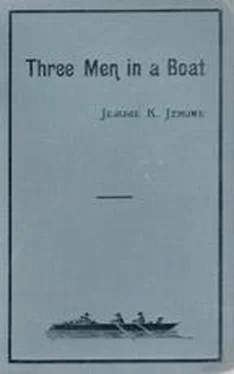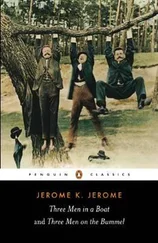You don't expect a man to never remember more than the first three lines of the first verse, and to keep on repeating these until it is time to begin the chorus. You don't expect a man to break off in the middle of a line, and snigger, and say, it's very funny, but he's blest if he can think of the rest of it, and then try and make it up for himself, and, afterwards, suddenly recollect it, when he has got to an entirely different part of the song, and break off, without a word of warning, to go back and let you have it then and there. You don't — well, I will just give you an idea of Harris's comic singing, and then you can judge of it for yourself.
HARRIS( STANDING UP IN FRONT OF PIANO AND ADDRESSING THE EXPECTANT MOB ): «I'm afraid it's a very old thing, you know. I expect you all know it, you know. But it's the only thing I know. It's the Judge's song out of PINAFORE — no, I don't mean PINAFORE — I mean — you know what I mean — the other thing, you know. You must all join in the chorus, you know.»
[ Murmurs of delight and anxiety to join in the chorus. Brilliant performance of prelude to the Judge's song in «Trial by Jury» by nervous Pianist. Moment arrives for Harris to join in. Harris takes no notice of it. Nervous pianist commences prelude over again, and Harris, commencing singing at the same time, dashes off the first two lines of the First Lord's song out of «Pinafore.» Nervous pianist tries to push on with prelude, gives it up, and tries to follow Harris with accompaniment to Judge's song out «Trial by Jury,» finds that doesn't answer, and tries to recollect what he is doing, and where he is, feels his mind giving way, and stops short. ]
HARRIS( WITH KINDLY ENCOURAGEMENT ): «It's all right. You're doing it very well, indeed — go on.»
NERVOUS PIANIST:«I'm afraid there's a mistake somewhere. What are you singing?»
HARRIS( PROMPTLY ): «Why the Judge's song out of Trial by Jury. Don't you know it?»
SOME FRIEND OF HARRIS'S( FROM THE BACK OF THE ROOM ): «No, you're not, you chuckle–head, you're singing the Admiral's song from PINAFORE.»
[ Long argument between Harris and Harris's friend as to what Harris is really singing. Friend finally suggests that it doesn't matter what Harris is singing so long as Harris gets on and sings it, and Harris, with an evident sense of injustice rankling inside him, requests pianist to begin again. Pianist, thereupon, starts prelude to the Admiral's song, and Harris, seizing what he considers to be a favourable opening in the music, begins. ]
HARRIS:
«`When I was young and called to the Bar.' »
[ GENERAL ROAR OF LAUGHTER, TAKEN BY HARRIS AS A COMPLIMENT. PIANIST, THINKING OF HIS WIFE AND FAMILY, GIVES UP THE UNEQUAL CONTEST AND RETIRES; HIS PLACE BEING TAKEN BY A STRONGER–NERVED MAN .]
THE NEW PIANIST( CHEERILY ): «Now then, old man, you start off, and I'll follow. We won't bother about any prelude.»
HARRIS( UPON WHOM THE EXPLANATION OF MATTERS HAS SLOWLY DAWNED — LAUGHING ): «By Jove! I beg your pardon. Of course — I've been mixing up the two songs. It was Jenkins confused me, you know. Now then.
[S INGING; HIS VOICE APPEARING TO COME FROM THE CELLAR, AND SUGGESTING THE FIRST LOW WARNINGS OF AN APPROACHING EARTHQUAKE. ]
«`When I was young I served a term
As office–boy to an attorney's firm.'»
( Aside to pianist ): «It is too low, old man; we'll have that over again, if you don't mind.»
[ SINGS FIRST TWO LINES OVER AGAIN, IN A HIGH FALSETTO THIS TIME. GREAT SURPRISE ON THE PART OF THE AUDIENCE. NERVOUS OLD LADY NEAR THE FIRE BEGINS TO CRY, AND HAS TO BE LED OUT. ]
HARRIS( continuing ):
«I swept the windows and I swept the door,
And I - `
No — no, I cleaned the windows of the big front door. And I polished up the floor — no, dash it — I beg your pardon — funny thing, I can't think of that line. And I — and I — Oh, well, we'll get on to the chorus, and chance it ( SINGS ):
`And I diddle–diddle–diddle–diddle–diddle–diddle–de,
Till now I am the ruler of the Queen's navee.'
Now then, chorus — it is the last two lines repeated, you know.»
GENERAL CHORUS:
«And he diddle–diddle–diddle–diddle–diddle–diddle–dee'd,
Till now he is the ruler of the Queen's navee.»
And Harris never sees what an ass he is making of himself, and how he is annoying a lot of people who never did him any harm. He honestly imagines that he has given them a treat, and says he will sing another comic song after supper.
Speaking of comic songs and parties, reminds me of a rather curious incident at which I once assisted; which, as it throws much light upon the inner mental working of human nature in general, ought, I think, to be recorded in these pages.
We were a fashionable and highly cultured party. We had on our best clothes, and we talked pretty, and were very happy — all except two young fellows, students, just returned from Germany, commonplace young men, who seemed restless and uncomfortable, as if they found the proceedings slow. The truth was, we were too clever for them. Our brilliant but polished conversation, and our high–class tastes, were beyond them. They were out of place, among us. They never ought to have been there at all. Everybody agreed upon that, later on.
We played MORCEAUX from the old German masters. We discussed philosophy and ethics. We flirted with graceful dignity. We were even humorous — in a high–class way.
Somebody recited a French poem after supper, and we said it was beautiful; and then a lady sang a sentimental ballad in Spanish, and it made one or two of us weep — it was so pathetic.
And then those two young men got up, and asked us if we had ever heard Herr Slossenn Boschen (who had just arrived, and was then down in the supper–room) sing his great German comic song.
None of us had heard it, that we could remember.
The young men said it was the funniest song that had ever been written, and that, if we liked, they would get Herr Slossenn Boschen, whom they knew very well, to sing it. They said it was so funny that, when Herr Slossenn Boschen had sung it once before the German Emperor, he (the German Emperor) had had to be carried off to bed.
They said nobody could sing it like Herr Slossenn Boschen; he was so intensely serious all through it that you might fancy he was reciting a tragedy, and that, of course, made it all the funnier. They said he never once suggested by his tone or manner that he was singing anything funny — that would spoil it. It was his air of seriousness, almost of pathos, that made it so irresistibly amusing.
We said we yearned to hear it, that we wanted a good laugh; and they went downstairs, and fetched Herr Slossenn Boschen.
He appeared to be quite pleased to sing it, for he came up at once, and sat down to the piano without another word.
«Oh, it will amuse you. You will laugh,» whispered the two young men, as they passed through the room, and took up an unobtrusive position behind the Professor's back.
Herr Slossenn Boschen accompanied himself. The prelude did not suggest a comic song exactly. It was a weird, soulful air. It quite made one's flesh creep; but we murmured to one another that it was the German method, and prepared to enjoy it.
I don't understand German myself. I learned it at school, but forgot every word of it two years after I had left, and have felt much better ever since. Still, I did not want the people there to guess my ignorance; so I hit upon what I thought to be rather a good idea. I kept my eye on the two young students, and followed them. When they tittered, I tittered; when they roared, I roared; and I also threw in a little snigger all by myself now and then, as if I had seen a bit of humour that had escaped the others. I considered this particularly artful on my part.
Читать дальше












